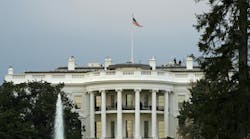Washington's major league baseball team surprised many people when it became the National League's eastern division champion in 2012 and made it to the post-season playoffs for the first time. It isn't the only group in the nation's capital that feels as if it's wearing a target these days.
The US oil and gas industry doesn't want to be singled out for new taxes by some members of the 113th Congress and the Obama administration who are looking for ways to quickly increase federal revenue.
"In the last week, the line I've heard repeatedly is 'You're right to be concerned'," Brian Johnson, the American Petroleum Institute's federal relations director, told reporters at a Feb. 11 luncheon. "The crystal ball in Congress is murky. There hasn't been a good revenue fight there for several years."
The prospect of sequestration, with its broad, automatic budget cuts, "tends to focus the discussion," observed Stephen Comstock, API's tax policy manager. Some members of Congress say Yellowstone National Park won't open this summer as a result, he said, adding: "Meanwhile, they see groups with what they believe are loopholes."
Pressure to address the federal deficit already was high in Congress when frequent crises erupted in 2012. Their urgent deadlines have created an atmosphere where a seemingly simple, quick fix is politically appealing.
"We don't want to be a political pay-for," Johnson said. "New federal oil taxes would provide revenue in the short term. They'd be costly in the long run."
Proposals to change the treatment of foreign taxes paid by US companies also would be harmful, Comstock indicated. "The tax rate for our companies in some countries—35%—is not the 10% Coca-Cola and General Electric pay," he explained.
Instant change
"Calling the difference a royalty and taxing it would instantly change US oil and gas companies' foreign investment economics," Comstock continued. "Their overseas investments would shrink as their non-US competitors gained an advantage.
API's lobbyists have been reaching out not only to delegations from states which already have production, but others such as North Carolina where it could emerge. "There are a lot which traditionally weren't that are becoming producers now," Comstock said. "We're talking to anyone—Democrats and Republicans—who is open-minded."
They also recognize that the industry's size means it will need to actively participate in any meaningful federal budget reform discussions if they ultimately take place.
"Voters recognize the realities of potential production and job losses at the end of the day," Johnson said. "They want an honest discussion of these issues, not a short-sighted revenue grab. That's been bad policy in the past. It's bad policy now."
